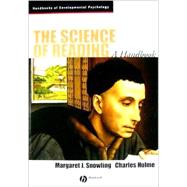
Note: Supplemental materials are not guaranteed with Rental or Used book purchases.
Purchase Benefits
Charles Hulme is Professor of Psychology at the University of York. His research is on memory, reading and language processes and their development. He was the joint recipient of the Dina Fietelson Award of the International Reading Association for research on reading intervention, in 1998.
| List of Contributors | |
| Preface | |
| Acknowledgments | |
| Word Recognition Processes in Reading: Editorial Part I | |
| Modelling Reading: The Dual-Route Approach | |
| Connectionist Approaches to Reading | |
| Visual Word Recognition: Theories and Findings | |
| The Question of Phonology and Reading | |
| Eye Movements During Reading | |
| Learning to Read and Spell: Editorial Part II | |
| Theories of Learning to Read | |
| Writing Systems and Spelling Development | |
| Development of Sight Word Reading: Phases and Findings | |
| Predicting Individual Differences in Learning to Read | |
| Social Correlates of Emergent Literacy | |
| Literacy and Cognitive Change | |
| Reading Comprehension: Editorial Part III | |
| Comprehension | |
| The Acquisition of Reading Comprehension Skill | |
| Children's Reading Comprehension Difficulties | |
| Reading in Different Languages: Editorial Part IV | |
| Orthographic Systems and Skilled Word Recognition Processes in Reading | |
| Early Reading Development in European Orthographies | |
| Learning to Read in Chinese | |
| The Nature and Causes of Dyslexia in Different Languages | |
| Disorders of Reading and Spelling: Editorial Part V | |
| Developmental Dyslexia | |
| Learning to Read with a Hearing Impairment | |
| Learning to Read with a Language Impairment | |
| Acquired Disorders of Reading | |
| Spelling Disorders | |
| Biological Bases of Reading: Editorial Part VI | |
| Genetics of Dyslexia | |
| Functional Brain Imaging Studies of Skilled Reading and Developmental Dyslexia | |
| Teaching Reading: Editorial Part VII | |
| Teaching Children to Read: What Do We Know About How to Do It? | |
| Recent Discoveries from Research on Remedial Interventions for Children with Dyslexia | |
| Glossary of Terms | |
| References | |
| Author Index | |
| Subject Index | |
| Table of Contents provided by Publisher. All Rights Reserved. |
The New copy of this book will include any supplemental materials advertised. Please check the title of the book to determine if it should include any access cards, study guides, lab manuals, CDs, etc.
The Used, Rental and eBook copies of this book are not guaranteed to include any supplemental materials. Typically, only the book itself is included. This is true even if the title states it includes any access cards, study guides, lab manuals, CDs, etc.